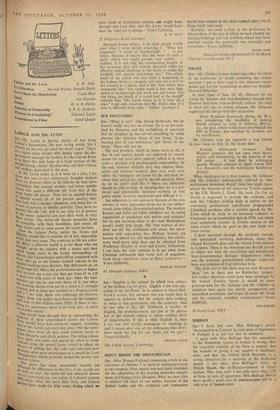tabour and Mr. Levin B. W. Dale
Sex Education Nicolas Walter, Donald Davie ll
on t Shoot the Obstetrician Israel Jordan Anatomy of Partnership 'Pioneers in Criminology' Commitment in Films
Frank Hart Ion Kimche H. A. R. Philby L. F. G. Anthony Edmund Leach Isabel Quigly
LABOUR AND MR. LEVIN SIR.----Mr. Levin is having plenty of fun from Labour's discomforts. He uses strong words, but I ',nerve he has not yet used the word 'regret.' There are a great many people who deeply regret the dis- isgreeMents amongst the leaders, for the Labour Party to them the only hope of a large section of the people having a better life than they and their fathers and mothers have had in the past. As Mr. Levin writes as if it were all a joke, I jot ths'wo just one or two elementary thoughts (indeed „ ere are dozens) which in his hilarity he may have „-,verlooked. The manual workers and lower middle classes live quite a different life from that of the 44 better-off classes. They live in squalid houses hn squalid streets, all of thc poorest quality; they aave had only a meagre education, and many live in _stale of poverty or shabby gentility. They have no i.e.neujilY like the rich, and at any time (as at present sh 'ne motor industry) can lose their work at very a °rt notice. The better-off classes) t have sympathy with their hardships, and resent all wage claims and to some extent the social services. /All"' the Labour Party, unlike the Tories and 43—crals, would like to remedy all of this, impossible the task may seem. The contrasts in life arc colos- sal. What uat a different world it is for those who are 8 eught up-in the nursery with a nanny and then st3hend haPPy years in the lovely surroundings of those °pis like Charterhouse and Clifton compared with , who go to the former council schools in the squalid working-class districts. The differences go on eil .through life. When the professional men or higher a VII servants get a pay rise they get from £5 to LIO Week rise with years of back pay; when the busi- Crilen get one no one ever hears of it; but when ree. working classes even put in a claim it is strongly arisIsted, and at times has resulted in a financial crisis " a 7 per cent. Bank rate (although the Govern- weeinrs Bank rate policy must have cost the taxpayer Of I over £1,000 million since 1951). If there is any- sz lag for l pensioners there is no back pay—it starts a Months ahead! i„, one would have thought that in representing the l','erests of these unprivileged classes the Labour that of Mr. rtY would have had universal support, including , Levin, yet every day since 1945 the news- ),„'Prs have done all they could without mercy to i;"arM the party and all its policies. The ruling classes i„le spent vast sums and spared no effort to crush t,'_uour; even the armed forces joined in when, on grammes e V e of polling day, the radio and television pro- gave great prominence to a speech by Lord 7iontgornery, which probably turned the service vote against Labour. The - ale Party has been shamefully treated, yet N. °gh the differences in the lives of the people are
as as ever, the better-off and educated classes
dieall expressing joy, not regret, at Labour's present inculties. After the mess their Tory and Liberal Parties have made for fifty years, during which we have lived at continuous tension, one might have thought that even they, and Mr. Levin, would have seen the need for a change.—Yours faithfully,
B. W. DALE
27 Ridgeway Road, Salisbury [Bernard Levin writes: 'I do wish people would read what I write before attacking it. "What has happened," 1 wrote of Scarborough, ". . . is not funny, because it means that the want of such a party, which was rarely, greater, may remain . . unfilled. It is not only the commanding heights of the economy that will remain unsealed while no effective radical challenge to the Tories is made; the foothills will remain untouched, too." The whole tenor of my article was that what is happening to the Labour Party is a tragedy, not only for it but for the country as a whole. And if Mr. Dale thinks that statements like "The simple truth is that what hap- pened at Scarborough this week was not funny. For one thing, too much of it tasted foul in the mouth" indicate that "Mr. Levin writes as if it were all a joke," I can only conclude that Mr. Dale's idea of a joke is different from mine.'—Editor, Spedtator.]


















































 Previous page
Previous page